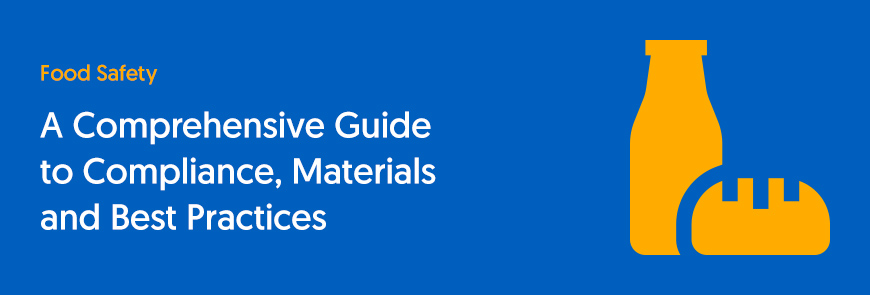In this article
The Ultimate Food Safety Guide

Food Grade vs. Food Safe Materials
In food production, the terms 'food-grade' and 'food-safe' are often used interchangeably, but they carry significant differences. In our comprehensive guide, we elucidate what these terms truly mean, distinguishing between materials that are merely suitable for food contact and those that ensure the safety of the end product. This distinction becomes essential when considering the adherence to Good Manufacturing Practices (GMP). Even food-grade materials can lead to unsafe products if proper procedures aren't followed. These practices, play a crucial role in safeguarding the food production process, maintaining quality standards and ensuring full traceability of materials. Furthermore, we shed light on the importance of certifications and their role in validating the compliance of materials and processes with food safety regulations. We also share insights into the challenges manufacturers often face in maintaining compliance and how ERIKS supports businesses in ensuring food-safe production. Read all about the food grade materials in a food-safe production process here.

The Imperative of Traceability in Food Production
Achieving traceability in food production is a complex process; it involves knowing the origin of materials, ensuring the compliance of raw materials with established guidelines and understanding that solutions crafted with non-traceable materials may not guarantee 100% food grade quality. At ERIKS, we are dedicated to raising awareness about traceability, helping organisations navigate legislative hurdles. ERIKS offers hands-on support to businesses confronting issues related to the implementation of EC1935/2004. Moreover, we recognize the severe implications of recalls in the food chain and strive to prevent such mishaps through our stringent certification and audit process. We also facilitate workshops aimed at enlightening various departments within a company about the importance of traceability and aid in the development of effective registration systems. Our specialists Berry Kragt and Edwin van Nieuwenhoven - champions of food safety - share all about traceability in this article.

Regulations - EC1935/2004 Legislation
EC1935/2004 is a critical European Union regulation introduced to ensure the safety of Food Contact Materials (FCMs). These are the materials that interact with food during production, processing and storage. This legislation mandates that all FCMs be manufactured following Good Manufacturing Practice (GMP), to prevent them from endangering human health or altering the food's composition. Compliance is ensured through comprehensive certification. Effective compliance strategies include forming a dedicated food safety team, performing recall simulations, regularly checking certification and proper storage of certification documents. Read our comprehensive guide to EC1935/2004 food contact materials regulations.

Ensuring Food Safety with the Right Hose Assembly
Choosing the correct hose assembly in the food industry is critical to uphold hygiene standards and prevent food contamination. Factors such as material compatibility, durability under various temperatures and pressures, adaptability in installation, and the coupling system's reliability should be considered. A standout feature is the Goodall® DuraCrimp® Food system, a custom-designed coupling system ensuring a seamless, hygienic, and leak-free connection between the hose and tube. Find an Essential Checklist for Selecting a Food Grade Hose Assembly here.

Guidelines for Choosing the Right Food-Safe Seal
Choosing the correct food-safe seal is crucial for ensuring the safety and quality of food products. Factors to consider include the type of food substance and temperature, cleaning methods used (SIP or CIP), the risk of contamination and the groove connection to prevent bacterial growth. Compliance with various standards like EC1935/2004, FDA and 3A for food-safe materials is essential for selecting the right seal. Read all about food safe seal examples, standards and tips.

Food-Safe Conveyor Solutions: Ensuring Compliance and Efficiency
Food-safe conveyor solutions are important for maximizing conveyor belt efficiency and ensuring food safety in the industry. Obtaining food safety certifications for conveyor belts helps demonstrate compliance with food safety standards. Expert inspection and analysis by conveyor specialists provide tailored food-safe conveyor solutions, improving efficiency and reducing costs. Read all about maximizing conveyor belt efficiency for food safety.

Hygienic Design: Ensuring Food Safety in the Food Industry
Hygienic design plays a vital role in the food industry, where proper hygiene is essential to prevent food contamination and ensure food safety. Compliance with hygiene requirements from the initial design stage is of utmost importance. The European Hygienic Engineering & Design Group (EHEDG) provides guidance on hygienic design, and ERIKS, as an EHEDG member, offers expertise and support in selecting the right materials and components for hygienic applications. Read more about the importance of hygienic design in our in-depth knowledge article.

Understanding H1 Fluids and Food Safety: An Expert Guide
In the food industry, maintaining proper food safety standards is crucial to prevent contamination and ensure the integrity of products. Vincent Meijer, Product Category Manager at ERIKS, emphasizes the importance of understanding the specific needs of each application when choosing lubricants. H1 lubricants, formulated to be food-grade and compliant with safety regulations, are designed to prevent contamination and are safe for incidental contact. ERIKS offers a step-by-step approach to assess needs, provide tailored solutions and optimize overall equipment performance. Additionally, proper cleaning procedures and attention to product quality are crucial for maintaining food safety standards. Collaborating with trusted brands, ERIKS delivers customized solutions that meet the highest safety standards in the food industry. Read the full interview with Vincent Meijer here.

Subscribe to our newsletter:
For the latest industry news and updates.
